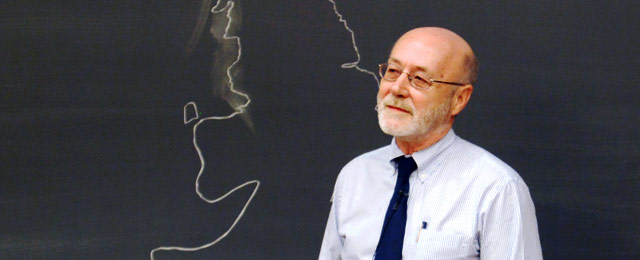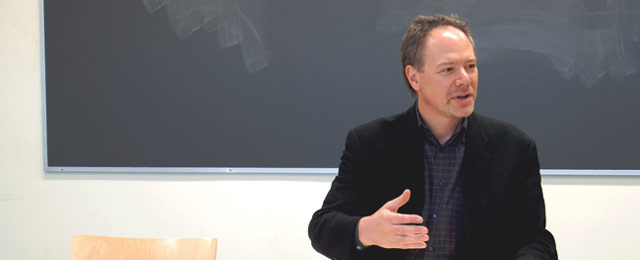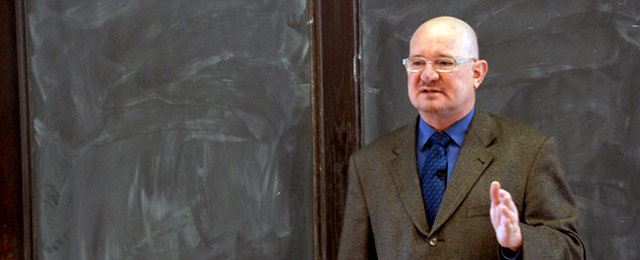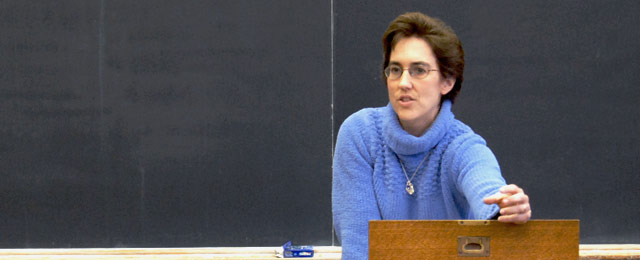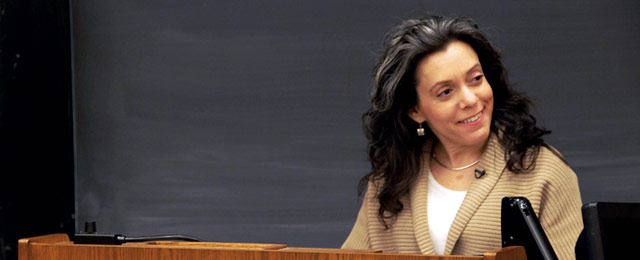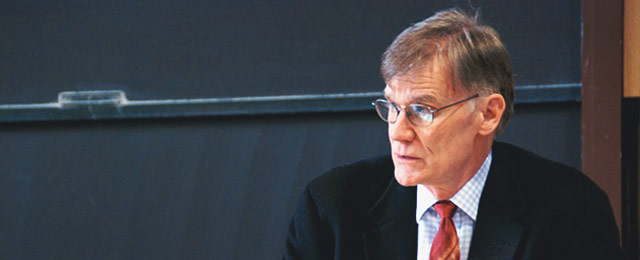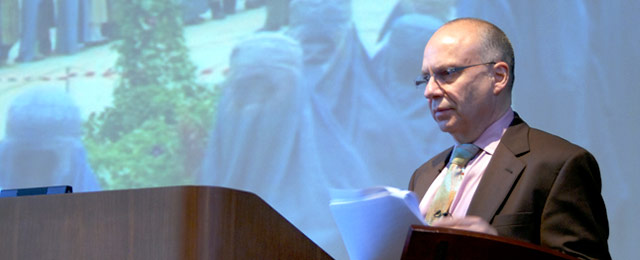Online courses directory (457)
Abnormal psychology is one of the most recognizable and intriguing subfields of study in psychology. Part of what makes this field so intriguing is that it challenges us to define what is normal and abnormal. Most experts in the field have settled on several criteria to define abnormal behavior; however, this definition and even the very existence of certain disorders still remain a source of debate. This course will help us to define abnormal and normal behaviors and to group these abnormal phenomena into disorders. These disorders are used to capture a particular type of abnormal psychological phenomena and to help us diagnose or make an educated decision regarding what disorder a patient/client may have. In order to distinguish between different disorders, clinicians often use the Diagnostic and Statistical Manual of Mental Disorders, which identifies the specific criteria used when diagnosing patients/clients. This manual represents the industry standard for psychologists and psychiatrists, who often…
This course is about the fundamental concepts of sociology; foundations of group life; social change, processes, and problems. This class describes the discipline of sociology—the study of social life. It is a fundamental social science (in good company with Economics, Psychology, History, Anthroplogy, Communication, and Political Science). What is interesting about sociology is that it actually tackles fundamental questions in each of these sub-disciplines. You might even call it the “father” of the social sciences. That said, it is a pretty new discipline (younger than our country). Still, we have done a lot in just a very short time. It is very likely that you have heard of some of its early founders—the most famous is Karl Marx but others include Max Weber and Emile Durkheim.
In this course, we will study the architecture of Ancient Rome, beginning with its origins in the eighth century BC, and continuing through the fourth century AD with the move of the Roman capital to Constantinople. The course of lectures and readings outlined below will familiarize you with the major building methods and styles used in Roman architecture. In addition, interior decoration (including the very important topic of Roman wall painting) will be addressed. By the end of the course, you will be able to identify some of the most important works of Roman architecture and discuss the historical and cultural conditions that informed their production. An important theme throughout the first half of the course is the relationship between Ancient Rome and Greek and Etruscan cultures, which were highly influential in the formation of a distinctive Roman architecture. Understanding the role that Roman architecture played in the eastern and western Roman provinces is also significant to this course,…
人文學,其特色在於「慢熱」,需要耐心細嚐、咀嚼古聖先賢的智慧結晶與其文字背後所隱含的真正意義。史記系列課程將透過對《史記》一書的導讀,引領同學們探究史學之「真」與「善」。 不管你是對中華文化感興趣者、想更深入了解傳統史學者、喜歡論理分析者、或是久仰太史公司馬遷之名之愛好者,這門課一定會讓你收穫良多。因為《史記》不僅記載了無數精彩非凡的歷史人事,更貫串了在它之前的多數古代典籍,可說是集中國上古文明精粹於一書。更重要的是,這門課程中將引導大家如何讀《史記》,進而學會如何讀中國史書、如何讀中國書。 這是一場史學的思辨之旅,希望各位同學千萬不要錯過!
This course is intended to provide an up-to-date introduction to the development of English society between the late fifteenth and the early eighteenth centuries. Particular issues addressed in the lectures will include: the changing social structure; households; local communities; gender roles; economic development; urbanization; religious change from the Reformation to the Act of Toleration; the Tudor and Stuart monarchies; rebellion, popular protest and civil war; witchcraft; education, literacy and print culture; crime and the law; poverty and social welfare; the changing structures and dynamics of political participation and the emergence of parliamentary government.
This course is intended as an introduction to political philosophy as seen through an examination of some of the major texts and thinkers of the Western political tradition. Three broad themes that are central to understanding political life are focused upon: the polis experience (Plato, Aristotle), the sovereign state (Machiavelli, Hobbes), constitutional government (Locke), and democracy (Rousseau, Tocqueville). The way in which different political philosophies have given expression to various forms of political institutions and our ways of life are examined throughout the course.
This course provides a historical study of the origins of Christianity by analyzing the literature of the earliest Christian movements in historical context, concentrating on the New Testament. Although theological themes will occupy much of our attention, the course does not attempt a theological appropriation of the New Testament as scripture. Rather, the importance of the New Testament and other early Christian documents as ancient literature and as sources for historical study will be emphasized. A central organizing theme of the course will focus on the differences within early Christianity (-ies).
This course examines the Old Testament (Hebrew Bible) as an expression of the religious life and thought of ancient Israel, and a foundational document of Western civilization. A wide range of methodologies, including source criticism and the historical-critical school, tradition criticism, redaction criticism, and literary and canonical approaches are applied to the study and interpretation of the Bible. Special emphasis is placed on the Bible against the backdrop of its historical and cultural setting in the Ancient Near East.
The American Revolution entailed some remarkable transformations--converting British colonists into American revolutionaries, and a cluster of colonies into a confederation of states with a common cause--but it was far more complex and enduring than the fighting of a war. As John Adams put it, "The Revolution was in the Minds of the people... before a drop of blood was drawn at Lexington"--and it continued long past America's victory at Yorktown. This course will examine the Revolution from this broad perspective, tracing the participants' shifting sense of themselves as British subjects, colonial settlers, revolutionaries, and Americans.
This course explores the causes, course, and consequences of the American Civil War, from the 1840s to 1877. The primary goal of the course is to understand the multiple meanings of a transforming event in American history. Those meanings may be defined in many ways: national, sectional, racial, constitutional, individual, social, intellectual, or moral. Four broad themes are closely examined: the crisis of union and disunion in an expanding republic; slavery, race, and emancipation as national problem, personal experience, and social process; the experience of modern, total war for individuals and society; and the political and social challenges of Reconstruction.
This course explores main answers to the question, "When do governments deserve our allegiance?" It starts with a survey of major political theories of the Enlightenment—Utilitarianism, Marxism, and the social contract tradition—through classical formulations, historical context, and contemporary debates relating to politics today. It then turns to the rejection of Enlightenment political thinking. Lastly, it deals with the nature of, and justifications for, democratic politics, and their relations to Enlightenment and Anti-Enlightenment political thinking. Practical implications of these arguments are covered through discussion of a variety of concrete problems.
This introductory course connects anyone interested in developing an understanding of the observation and analysis of performance in sport. It offers synchronous opportunities to discuss topics but it is fundamentally asynchronous in sharing, aggregating and curating resources. It is hoped that access to open resources prior to synchronous meetings will give the course some flipped characteristics. The content of each topic is intended to be an introduction to that topic. We recommend that everyone access the Connecting and Sharing topic as the first module in the course in order to establish a framework for our activities over the subsequent four weeks. Thereafter the route taken through the remaining four modules will be a personal choice.
This course will explore the mutual influences of ideas of nature, theories of city design and planning, and practices of urban design, construction, and management. We will investigate how natural processes shape urban landscapes (from the scale of street corner to region) and how to intervene strategically in those processes in order to achieve certain goals. We will examine cases of cities that adapted successfully to natural processes and those that did not. Students will then have the opportunity to research a case of their choice and to present their findings for discussion. The subject may be historical or an an example of contemporary theory and practice. Additional information is also available at Professor Spirn's class website.
This course will explore the mutual influences of ideas of nature, theories of city design and planning, and practices of urban design, construction, and management. We will investigate how natural processes shape urban landscapes (from the scale of street corner to region) and how to intervene strategically in those processes in order to achieve certain goals. We will examine cases of cities that adapted successfully to natural processes and those that did not. Students will then have the opportunity to research a case of their choice and to present their findings for discussion. The subject may be historical or an an example of contemporary theory and practice. Additional information is also available at Professor Spirn's class website.
Western philosophy and theoretical mathematics were born together, and the cross-fertilization of ideas in the two disciplines was continuously acknowledged throughout antiquity. In this course, we read works of ancient Greek philosophy and mathematics, and investigate the way in which ideas of definition, reason, argument and proof, rationality and irrationality, number, quality and quantity, truth, and even the idea of an idea were shaped by the interplay of philosophic and mathematical inquiry.
This class examines how anthropology and speculative fiction (SF) each explore ideas about culture and society, technology, morality, and life in "other" worlds. We investigate this convergence of interest through analysis of SF in print, film, and other media. Concepts include traditional and contemporary anthropological topics, including first contact; gift exchange; gender, marriage, and kinship; law, morality, and cultural relativism; religion; race and embodiment; politics, violence, and war; medicine, healing, and consciousness; technology and environment. Thematic questions addressed in the class include: what is an alien? What is "the human"? Could SF be possible without anthropology?
The Beijing Urban Design Studio is a joint program between the MIT and Tsinghua University Schools of Architecture and Planning. The goal of the studio is to foster international cooperation through the undertaking of a joint urban design and planning initiative in the city of Beijing involving important, often controversial, sites and projects. Since 1995, almost 250 MIT and Tsinghua University students and faculty have participated in this annual studio, making it one of the most successful and enduring international academic programs between China and the US. It has received the Irwin Sizer Award from MIT for outstanding innovation in education. The studio takes place over five weeks in June and July including several weeks in residence at Tsinghua University and two brief study tours to locations and projects that inform the work. It will include 18-20 MIT and 10-15 Tsinghua Architecture and Planning students. The Beijing City Planning Institute, responsible for strategic planning in the city, participates in the studio as the client.
The Beijing Urban Design Studio is a joint program between the MIT and Tsinghua University Schools of Architecture and Planning. The goal of the studio is to foster international cooperation through the undertaking of a joint urban design and planning initiative in the city of Beijing involving important, often controversial, sites and projects. Since 1995, almost 250 MIT and Tsinghua University students and faculty have participated in this annual studio, making it one of the most successful and enduring international academic programs between China and the US. It has received the Irwin Sizer Award from MIT for outstanding innovation in education. The studio takes place over five weeks in June and July including several weeks in residence at Tsinghua University and two brief study tours to locations and projects that inform the work. It will include 18-20 MIT and 10-15 Tsinghua Architecture and Planning students. The Beijing City Planning Institute, responsible for strategic planning in the city, participates in the studio as the client.
In 2008, the Beijing Urban Design Studio will focus on the issue of Beijing's urban transformation under the theme of de-industrialization, by preparing an urban design and development plan for the Shougang (Capital Steel Factory) site. This studio will address whether portions of the old massive factory infrastructure can be preserved as a national industrial heritage site embedded into future new development; how to balance the cultural and recreational value of the site with environmental challenges; as well as how to use the site for urban development. A special focus of the studio will be to consider development approaches that minimize energy utilization.
To research these questions, students will be asked to interact with clients from the factory, local residents, city officials and experts on transportation, environment, energy and real estate. They will assess strategic options for the steel factory and propose comprehensive plans for the design and development of the brownfield site.
In 2008, the Beijing Urban Design Studio will focus on the issue of Beijing's urban transformation under the theme of de-industrialization, by preparing an urban design and development plan for the Shougang (Capital Steel Factory) site. This studio will address whether portions of the old massive factory infrastructure can be preserved as a national industrial heritage site embedded into future new development; how to balance the cultural and recreational value of the site with environmental challenges; as well as how to use the site for urban development. A special focus of the studio will be to consider development approaches that minimize energy utilization.
To research these questions, students will be asked to interact with clients from the factory, local residents, city officials and experts on transportation, environment, energy and real estate. They will assess strategic options for the steel factory and propose comprehensive plans for the design and development of the brownfield site.
Trusted paper writing service WriteMyPaper.Today will write the papers of any difficulty.




